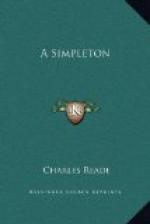Harness mended; fresh start. The Hottentots and Kafir vociferated and yelled, and made the unearthly row of a dozen wild beasts wrangling: the horses drew the bullocks, they the wagon; it crawled and creaked, and its appendages wobbled finely.
Slowly they creaked and wobbled past apricot hedges and detached houses and huts, and got into an open country without a tree, but here and there a stunted camel-thorn. The soil was arid, and grew little food for man or beast; yet, by a singular freak of nature, it put forth abundantly things that here at home we find it harder to raise than homely grass and oats; the ground was thickly clad with flowers of delightful hues; pyramids of snow or rose-color bordered the track; yellow and crimson stars bejewelled the ground, and a thousand bulbous plants burst into all imaginable colors, and spread a rainbow carpet to the foot of the violet hills; and all this glowed, and gleamed, and glittered in a sun shining with incredible brightness and purity of light, but, somehow, without giving a headache or making the air sultry.
Christopher fell to gathering flowers, and interrogating the past by means of them; for he had studied botany: the past gave him back some pitiably vague ideas. He sighed. “Never mind,” said he to Dick, and tapped his forehead: “it is here: it is only locked up.”
“All right,” said Dick; “nothing is lost when you know where ’tis.”
“This is a beautiful country,” suggested Christopher. “It is all flowers. It is like the garden of—the garden of—locked up.”
“It is de—light—ful,” replied the self-compelled optimist sturdily. But here nature gave way; he was obliged to relieve his agricultural bile by getting into the cart and complaining to his sister. “’Twill take us all our time to cure him. He have been bepraising this here soil, which it is only fit to clean the women’s kettles. ’Twouldn’t feed three larks to an acre, I know; no, nor half so many.”
“Poor soul! mayhap the flowers have took his eye. Sit here a bit, Dick. I want to talk to you about a many things.”
While these two were conversing, Ucatella, who was very fond of Phoebe, but abhorred wagons, stepped out and stalked by the side, like an ostrich, a camelopard, or a Taglioni; nor did the effort with which she subdued her stride to the pace of the procession appear: it was the poetry of walking. Christopher admired it a moment; but the noble expanse tempted him, and he strode forth like a giant, his lungs inflating in the glorious air, and soon left the wagon far behind.
The consequence was that when they came to a halt, and Dick and Phoebe got out to release and water the cattle, there was Christopher’s figure retiring into space.
“Hanc rem aegre tulit Phoebe,” as my old friend Livy would say. “Oh dear! oh dear! if he strays so far from us, he will be eaten up at nightfall by jackals, or lions, or something. One of you must go after him.”




